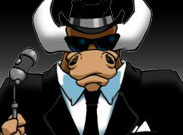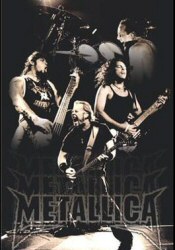Metallica
Entertainers Home / Entertainment Channel
ALSO! Don't miss our Metallica Deep Cuts.
Due their very existence, Metallica is one of the most divisive, “love ‘em or hate ‘em” bands ever. While they can tout their status as that of the 18th biggest selling act in American music history (57 million albums sold in the United States alone; approximately 100 million total), Metallica have never had it as easy as some other bands. They built their following through relentless touring throughout the 1980s and never thinking twice when it came to taking risks with their music.
Metallica formed in Downey, California in 1981 thanks to the collaboration of drummer Lars Ulrich and vocalist/guitarist James Hetfield. They met through the classifieds section, as each had placed in ad hoping to find band mates. The original lineup wound up being Ulrich, Hetfield, and guitarist Lloyd Grant, who was never considered a full-time member. Bassist Ron McGovney would join the band soon after, rounding out the group’s first incarnation of musicians.
Early 1982 saw the recording of “Hit the Lights” (which would later wind up on Kill ‘Em All) for the inaugural Metal Massacre compilation. Grant made contributions to the song, but it became clear that Metallica needed a full-time guitarist if they wanted to press on. Ulrich once again placed an ad in the classifieds, and none other than Dave Mustaine came knocking on the door. Hetfield and Ulrich were so impressed with him right out of the gate that they asked him to join before he could even formally audition. His addition, however, would cause problems. He essentially chased McGovney out of the band, but his exit was soon patched up as Cliff Burton joined Metallica on bass.
It turned out that McGovney was ahead of the curve, as Mustaine’s drunken, out-of-control antics would soon be too much for Hetfield, Ulrich, and Burton to put up with. He was kicked out of the band and was soon replaced by Kirk Hammett of Exodus fame. This would cement the early Metallica lineup.
1983’s Kill ‘Em All was the band’s first full-length record. With prolonged, hair-raising guitar solos accompanied by Hetfield’s gruff, aggressive vocals, Metallica soon found themselves a staple of the Bay Area metal scene.
Ride the Lightning was released in 1984 and it showed the band progressing rapidly from a musical standpoint. “Fade to Black” was voted in 2001 as the most popular Metallica song ever by the fans, and the song is still a staple of the band’s live shows. “The Call of Ktulu” is an eight minutes-plus instrumental with various movements, tempo changes, and moods.
It was 1986 that proved to be Metallica’s jackpot year. The band had signed a major label deal with Elektra Records in 1984 after the release of Ride the Lightning, but Master of Puppets was their debut on the label. Largely regarded as the best heavy metal record ever recorded, Master of Puppets took the world by storm and cemented Metallica in the mainstream.
As the success grew at a torrid pace, tragedy struck. Bassist Cliff Burton died on September 26, 1986 near Ljungby, Sweden in a tour bus accident. Icy roads were the cause of the tragedy, and remaining members Hetfield, Ulrich, and Hammett were unsure if the band could continue on. They knew that Burton would want them to carry on, and Metallica wasted no time in finding a replacement. Jason Newsted would join the band just three weeks later.
His debut would come in the form of 1988’s …And Justice for All, which featured “One,” the band’s first real single and their first video. Justice saw Metallica taking a brutal, no-holds-barred approach, particularly on songs such “Blackened” and “Dyers Eve.” Hammett was named “Guitarist of the Year” by many publications for his work on this album.
1991’s self-titled album (often referred to as “The Black Album”) saw Metallica shifting styles once again. Featuring no less than five singles, The Black Album is Metallica’s best-selling and most popular album. Accusations that the band had sold out quickly surfaced by diehard fans that were in no mood for songs like “Nothing Else Matters,” but Metallica took the success and ran with it. A huge tour followed the release of the album, with every date selling out – some in a matter of hours.
After three years of touring in support of Metallica, the band went on hiatus until 1996, which was when Load hit store shelves. Bluesy and less aggressive, many fans were completely dumbfounded by the record. Singles such as “Until It Sleeps” and “Hero of the Day” got plenty of airplay, but Metallica diehards were begging for a return to the heavy.
The accompanying piece to Load, 1997’s Reload, really showed no return to the heavy-as-hell Metallica of old. Reload featured hit songs in “The Memory Remains” and “The Unforgiven II,” but the criticism never let up. While it could be easily argued that Load and Reload were stylistic launching pads for Metallica, it could just as easily be argued that the band was simply trying to reach as many people as possible instead of catering to the fans who got them to where they were.
1998’s Garage, Inc. offered up Metallica covers of popular and underground bands who had inspired them over the years. Their take on Bob Seger’s “Turn the Page” proved to be enormously successful.
An experiment in every way, Metallica’s two shows with the San Francisco Symphony Orchestra renewed interest among fan bases worldwide. A 2-CD live collection, S&M, was released in 1999 to much fervor and criticism. Two new songs, “No Leaf Clover” and “- Human” were debuted with this release.
Two years later, a lineup change would once again test the fabric of Metallica. Bassist Jason Newsted left the band in 2001. He at first attributed his exit to prolonged physical damage due to touring, but it would later become apparent that the other members did not approve of Newsted’s side project, Echobrain.
To make things worse, singer/guitarist James Hetfield would enter rehab later in 2001 due to alcohol abuse. He did return to the band in 2002, and Metallica would remain a three-piece until as they prepared for the next album.
It was inevitable that a new bassist was needed, and winning the job was Robert Trujillo of Suicidal Tendencies and Ozzy Osbourne fame. He did not record for 2003’s St. Anger (producer Bob Rock handled those duties), but he did play on the subsequent “Madly in Anger with the World” tour.
Already in the studio preparing for the next record, Metallica shows no signs of ceasing any time soon. They are a workhorse of a band and continue to maintain not only their own creative control in every facet of their music, but also a stranglehold on the genre that they’ve contributed so much to.
 Tired of striking out? Check out these Dating Tips for all sorts of advice on how to finally get the girl! Also, we tell you all about some of the best online dating sites and how you can use them to hook up with more women!
Tired of striking out? Check out these Dating Tips for all sorts of advice on how to finally get the girl! Also, we tell you all about some of the best online dating sites and how you can use them to hook up with more women!
Metallica on the Web
Metallica.com
The band's official site.
Met Club
The band’s official fan club.
Live Metallica
An official bootleg site where users can purchase shows in soundboard quality.








